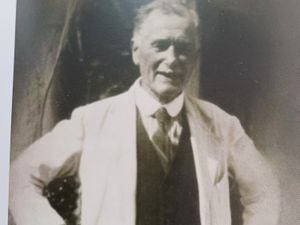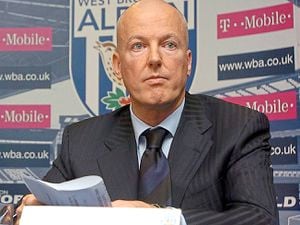How Harry's builder's yard carved out a place in city's history
Henry Carver recalls the first time he met his new boss at a timber yard in London's docklands.

His manager, a small Cockney war veteran, was clearly not a man to mince his words.
"So you're that posh bugger they've sent from head office," was his greeting.
Needless to say, young Henry, then in his late teens, did not see himself that way. But the two men hit it off straight away, the no-nonsense former army sergeant would be a major influence his business career.
Carvers Building Supplies held a belated celebration for its 125th anniversary at the weekend, with Henry having spent 40 of those years with the company.
The company's 125th anniversary was thought to have been in 2021, and historian Nigel Watson was commissioned to produce a book about the company's history. Covid restrictions meant it was not possible to do much to mark the milestone at the time, but staff and customers were able to make up for this with a black tie dinner and dance at Davenport House in Worfield on Saturday night.
Carver & Co was founded sometime about 1896 by Henry's great-grandfather Harry Carver started advertising as a builder operating in Moseley Village, close to the Heath Town area of Wolverhampton.
He would have been 27 years old, and probably still living with his widowed father and brothers and sisters at Neachells House in Wednesfield, which later became a pub. With several years experience in the construction industry under his belt, Harry was well-versed in the practical side of the trade. As the business grew, he realised he needed some help to look after the administrative side of the operation, so his younger brother Horace quit his job as a railway clerk to ensure everything ran smoothly. Before the First World War, Carver & Co had built several houses in Willenhall, including two rows of terraced houses on the north side of Willenhall Road, between Bowker Road and Challenor Avenue.
The Carver family already had a long tradition of running businesses, with Joseph Carver establishing a warehouse selling bridle equipment in Rushall Street, Walsall, as early as 1776. It was therefore not surprising that Harry Carver would want to follow in his family's footsteps. The Industrial Revolution brought an influx of people to the Black Country and surrounding areas, and Harry spotted an opportunity presented by the house-building boom.
However, by the turn of the 20th century, the demand for new houses was on the wane, the cost of the Boer War having driven interest rates up and led to an economic slump. It appears that by 1901 Harry and Horace had decided to focus on providing building supplies, with Harry operating from sites in Waterglade Lane, Willenhall, and also from a yard next to Wolverhampton's Queen Street (later High Level) railway station. The concept of a general builder's merchants selling a wide range of products was relatively new at this time, but the growth of the rail network meant it was now much easier to transport goods around the country.
The First World War had an inevitable impact on the building trade, not just through the halting of non-essential work, but through the loss of labour due to the call-up of the nation's young men. Harry's eldest son Roland, born in 1897, was among those who answered Lord Kitchener's call to arms, despite being underage.
A surge in housebuilding, responding to the pent-up demand after the war, followed by the 'homes for heroes' council-house building programmes during the 1920s, led to a period of growth. The company supplied ironmongery for the Low Hill estate, where more than 2,000 new homes were built, at the time one of the largest housing estates in the country.
To cope with the growing demand, the company moved out of the yard next to the railway station, to a new site in Stafford Street.
Harry Carver had died in 1941. While his older son Roland had emerged from the First World War unscathed, Harry's younger son Jeffery was killed in the Second World War at Tunisia on April 23, 1943, leaving Roland in sole charge of the family business. Harry left an estate valued at £72,000, approximately £3.7 million at today's prices.
Roland, who himself had experienced the horrors of war, was relieved when his son John returned home from war, having served in the ill-fated Arnhem campaign. Answering his father's call to help with the business, he dropped out of his engineering course at Cambridge University to join Carvers in 1947. They were joined by Roland's younger son, Roy, in 1958, who would become a driving force in diversifying Carvers' product lines. Soon after joining the company, he set up an agency to sell, install and maintain Aga cookers, which were made at the famous Coalbrookdale foundry in nearby Ironbridge. He expanded further by taking over Barrows Heating , which held the Aga sales franchise in southern Birmingham. As people began asking Carvers to convert their cookers to use oil, he started a new business to supply the fuel, and bought a second-hand tanker which was so unreliable it had to be driven by a trained mechanic. In 1974 he started supplying bottled gas, which would become a major part of the business.
Roy would also become a prominent figure in Wolverhampton, serving as a JP and chairman of the borough's health authority. He founded the Wolverhampton Marathon to raise money for St John Ambulance, which was building a new headquarters. Sadly, Roy died in 2000 before the centre opened.
The growth of what is now Wolverhampton University forced Carvers to vacate its depot in Stafford Street, meaning the business was now looking for new premises. One day John Carver looked out of the window of the first-floor showroom one day, and noticed an old railway goods yard lying idle. The Beeching cuts of the 1960s had seen Wolverhampton Low Level station turned into parcel-delivery centre, making the goods yard between Herbert Street and Little Lane redundant.
The new 66,000 sq ft complex opened in 1974, to coincide with the growing do-it-yourself market. It included a self-service warehouse and a showroom area where customers could see up to eight fully-fitted kitchens in room settings, as well as a range of bathrooms and fireplaces.
Henry Carver, the present managing director, joined the family business in 1983, at the age of 24. It was a difficult time for the business, in the wake of the a deep recession which had hit Wolverhampton particularly hard.
It fell to Henry to bring the business back into profit, after years of decline. Jobs were lost, the Willenhall operation was closed, and the oil business sold. Having learned the ropes under the watchful eye of the no-nonsense cockney war veteran at Sandell Perkins – now Travis Perkins – in London, he knew the importance of running a tight ship, and pilfering – which had been costing the company £100,000 a year – was stamped out. His experience at Sandell Perkins also taught him about the timber trade, and the Littles Lane depot was expanded to include a timber yard.
By 1985, Carvers was making money again, but it had been a tough learning curve for the young man.
"The experience scarred my early years in the business," says Henry.
"I vowed never to borrow money from the banks gain apart from to buy property." He acknowledged this might hold back the development of the business, but was determined to pursue growth by other means.
An economic boom saw sales almost double to £25 million between 1995 and 2001, and they would continue to grow until the financial downturn of 2008.
Then, just as the business appeared to have weathered the recession, disaster struck.
Just before midday on February 29, 2012, Henry Carver was sat in his office when his secretary burst in, clearly in a state of panic.
“It’s not another practice, it’s for real,” she said breathlessly.
A fire had broken out in a newly installed wood-burning boiler, and began spreading like wildfire.
The sky was engulfed with huge plumes of pitch-black smoke, 20ft flames shot through the roof, the sound of exploding gas cylinders rang out like gunfire.
Workers stood by in tears as their workplace, along with parked cars, were engulfed in a ball of fire.
Traffic ground to a standstill. Hundreds of people were evacuated from their homes, schools or university accommodation. The railway station was closed and all trains were diverted away from the city.
Within a couple of hours, a family business which had taken 116 years to build was destroyed.
“It was devastating,” says Henry Carver, who confided in fellow director Steve Moore that he thought it was the end.
He visited his mother Sheila, looking for sympathy.
"You won't get that here," she replied. She reminded him how the 80-year-old owner of a furniture store in Tottenham had managed to rebuild his business, after it was burned down in the previous year's summer riots.
"If that 80-year-old in Croydon can rebuild his business, so can you," she told him.
“I didn’t sleep at night for a few days, I was worried about whether we could recover," Henry recalls.
"But when I came in the next week and had some meetings with the insurers, they said they were going to support us, it was just a case of carrying out the due diligence.”
The company which supplied the faulty boiler agreed to a substantial out-of-court settlement, giving Henry the confidence to reinvest in the company.
What could not be replaced, though, were the priceless records relating to the company's long and illustrious history, which were lost to the flames.
Today, Carvers continues to keep it in the family, with Henry's son Jack representing the fifth generation to work for the business.





